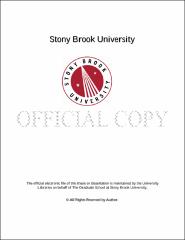The Role of Christian Doctrine in Shakespeare’s Hamlet
The Role of Christian Doctrine in Shakespeare’s Hamlet
| dc.identifier.uri | http://hdl.handle.net/11401/77512 | |
| dc.description.sponsorship | This work is sponsored by the Stony Brook University Graduate School in compliance with the requirements for completion of degree. | en_US |
| dc.format | Monograph | |
| dc.format.medium | Electronic Resource | en_US |
| dc.language.iso | en_US | |
| dc.publisher | The Graduate School, Stony Brook University: Stony Brook, NY. | |
| dc.type | Thesis | |
| dcterms.abstract | The following work analyzes Shakespeare’s use of Christian doctrine in his 17th century drama, Hamlet. The focus is to see how and for what reasons Shakespeare used his knowledge of Christian texts to construct Hamlet’s dialogue and setting. This research draws mainly from Shakespeare’s primary sources, the Geneva Bible and the Book of Common Prayer. Observing Hamlet through a biblical lens brings to light topics such as, the existence of purgatory and the rites of passage to heaven or hell. Taking into consideration Shakespeare’s contemporary society, views on topics such as purgatory, suicide, and confession, would have been mixed. Therefore, this analysis also looks at Hamlet’s reception by both its Protestant and Catholic audience. By examining Shakespeare’s use of Christian texts and how they correspond with his work, it is possible to find deeper meaning as to the development of Hamlet’s characters and how the play functions as a whole. | |
| dcterms.abstract | The following work analyzes Shakespeare’s use of Christian doctrine in his 17th century drama, Hamlet. The focus is to see how and for what reasons Shakespeare used his knowledge of Christian texts to construct Hamlet’s dialogue and setting. This research draws mainly from Shakespeare’s primary sources, the Geneva Bible and the Book of Common Prayer. Observing Hamlet through a biblical lens brings to light topics such as, the existence of purgatory and the rites of passage to heaven or hell. Taking into consideration Shakespeare’s contemporary society, views on topics such as purgatory, suicide, and confession, would have been mixed. Therefore, this analysis also looks at Hamlet’s reception by both its Protestant and Catholic audience. By examining Shakespeare’s use of Christian texts and how they correspond with his work, it is possible to find deeper meaning as to the development of Hamlet’s characters and how the play functions as a whole. | |
| dcterms.available | 2017-09-20T16:52:50Z | |
| dcterms.contributor | Videbaek, Bente | en_US |
| dcterms.contributor | Huffman, Clifford C | en_US |
| dcterms.creator | Palumbo, Kara | |
| dcterms.dateAccepted | 2017-09-20T16:52:50Z | |
| dcterms.dateSubmitted | 2017-09-20T16:52:50Z | |
| dcterms.description | Department of English | en_US |
| dcterms.extent | 36 pg. | en_US |
| dcterms.format | Monograph | |
| dcterms.format | Application/PDF | en_US |
| dcterms.identifier | http://hdl.handle.net/11401/77512 | |
| dcterms.issued | 2016-12-01 | |
| dcterms.language | en_US | |
| dcterms.provenance | Made available in DSpace on 2017-09-20T16:52:50Z (GMT). No. of bitstreams: 1 Palumbo_grad.sunysb_0771M_12739.pdf: 581295 bytes, checksum: 8083f4d4c9dae91b583131caedfb7150 (MD5) Previous issue date: 1 | en |
| dcterms.publisher | The Graduate School, Stony Brook University: Stony Brook, NY. | |
| dcterms.subject | Christian Doctrine, Geneva Bible, Hamlet, purgartory, reformation, Shakespeare | |
| dcterms.subject | English literature -- Literature -- Biblical studies | |
| dcterms.title | The Role of Christian Doctrine in Shakespeare’s Hamlet | |
| dcterms.title | The Role of Christian Doctrine in Shakespeare’s Hamlet | |
| dcterms.type | Thesis |

